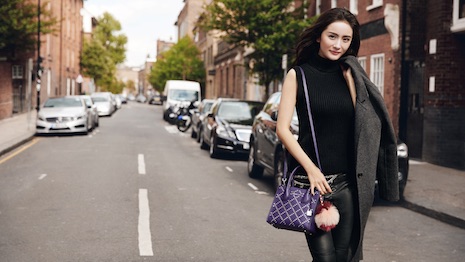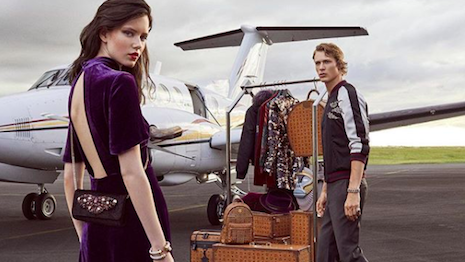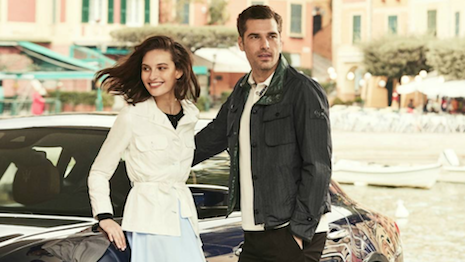A new class of affluent consumers means luxury sectors are experiencing several changes, including growing appreciation for experiences rather than goods, amid a period of strong growth.
During a webinar presented by Euromonitor, researchers identified several disruptors in the luxury business, including an emphasis on experiences and sustainability. Luxury spending growth in Asia Pacific, particularly China, is also having widespread implications.
“It is increasingly difficult for luxury companies to keep up with competitors,” said Fflur Roberts, head of luxury goods research at Euromonitor, London. “The last five years have thrown up some of the toughest trading conditions the luxury industry has ever seen.
“There are, however, signs that the tide is turning,” she said. “That said, investors remain cautious.”
Luxury on the rise
With Asia Pacific leading the way in global sales, Chinese consumers are responsible for 68 percent of the region's spend on luxury goods. Sales in Asia Pacific grew by 9 percent in 2018 and accounted for 41 percent of global luxury goods spending.
Western Europe edges out North America as the second largest market for luxury spending, but growth has slowed due to political instability in the region. North America saw a decline in spending by 2 percent, according to Euromonitor.

Asian consumers are leading the way in luxury spending. Image credit: Michael Kors
Nonetheless, the world's five largest markets still account for 50 percent of luxury sales, explained Ms. Roberts.
However, political instability may lead to a decline in global travel, which in turn could depress luxury spending.
For instance, in recent weeks France has seen dramatic, violent and damaging protests over a proposed hike in diesel fuel taxes. With France being such an important part of the luxury retail world, forcing closures and driving out tourists during the holiday season could have a lasting impact (see story).
By 2023, China is expected to top the United States and Germany as the largest source of outbound tourists. Chinese tourists have long been desirable customers among brands because of their high spending on luxury goods.
Chinese affluent look to purchase luxury goods while traveling abroad, and Chinese consumers spend the most out of any group while traveling. YouGov's Affluent Perspective 2017: Chinese Luxury Shoppers in America finds that 56 percent of Chinese affluent are planning a trip to the U.S. within the next two years (see story).

Millennials are less interested in accumulating luxury goods. Image credit: Printemps
Euromonitor also expects growth in luxury cars and experiential luxury to outpace growth across all other luxury segments in the next five years. Luxury hospitality and travel brands will also experience an increase in importance as a result of this growth.
Millennials across all global regions are driving spending on experiences rather than personal goods.
For these younger consumers who experienced the last financial crisis at an impressionable age, value is about more than price. Quality, experience and authenticity are all important considerations.
Unique experiences continue to be one of the defining characteristics of luxury purchases, as more mass market and premium labels encroach on traditional heritage brands. Upscale boutiques, restaurants and hotels can all offer luxurious experiences that cannot be replicated digitally (see story).
Sustainable practices are also a new expectation millennials are placing on luxury brands. Traveling for nature activities and eco-tourism are on the rise as well, with hospitality brands eliminating single-use plastics and ensuring more local ingredients on their menus.
“We believe it will be increasingly important for companies to be completely transparent about their ethical stances and show that they care about the planet as well as its people,” Ms. Roberts said. “Luxury, and especially hospitality, still needs to display opulence and in many ways that makes sustainability more challenging for these companies.”
Additional insights
Forward-thinking luxury brands are making efforts to adapt as affluent consumers' lifestyles and priorities change.
As travelers of all ages become more environmentally conscious, luxury hotel brands are introducing more sustainability initiatives that prove hospitality does not need to sacrifice upscale experiences to achieve ecological and social responsibility.
Hospitality groups such as the Peninsula Hotel and Marriott International have been increasingly transparent with their guests about their newest sustainability efforts, which aim to benefit people and the planet. Environmental efforts do ultimately impact brands' bottom lines, whether through additional expenses or appealing to more travelers (see story).
In particular, millennials expect brands to be more value-conscious, though not necessarily in the way marketers have come to anticipate. The five most important values to millennials are honesty, reliability, helping family, compassion and commitment, according to Morning Consult.
When it comes to brand loyalty, millennials — similarly to other demographics — turn to brands that are well-priced for the quality. Nearly half of millennials, 48 percent, admit to having some brand preferences but will also consider alternatives (see story).
“Consumers overall are really continuing to reassess their priorities asking themselves what they truly value in luxury,” Euromonitor's Ms. Roberts said. “More and more, we're seeing luxury become less about prized or material goods and more about acquiring meaningful experiences.”
{"ct":"Y8p5uFrjPDj+\/0LOmHF8qZCTU4Wp8KSX\/90\/ExVCGhwucDMkkUo71\/uF6++vedP6vwh3ECzB3eQuCKdXRt25oz3W30ULfI4yeXM+llpOgXiE+CKq8+L7sQVz+pdcEUt\/eHabqKu20H0qnHCxY6X3eviAl+IcUwm\/PXVWYX7+eCbLeHrKqefR7s15e76C+tbQZoHlJdVH4tuKX\/wRHDJr4s\/IU0X0yZVU7+2hRM+lQFn5C2rRj61oAKKe9a03FBBE7mB54AQxvHz7XRbMz9JfxQVbaAIU79GyeMLdbmP6CfrHG0CRsB\/VVOC2xUXa9\/6bVqVKltMuPShLLCH6frUuWQis7n98XmKHSAH0gSb0OPwjK8n\/XowNZM9vmfO+TlI+2092t2g125Hrl2rmucDW22r+2R3S+I\/jwk90CBxgRHJFO1jAqyiAC1o9fvNscDcXgyBIMSMtWg3dSHta7KZMu4sbpc6YUL1epLwA9oCUAf+btWttxTypG3O56r6wA8xpIUo3UezqtYPu538OO3f6oxud\/yq\/AgX71vJNVjKH9O0sKND5ZO7i\/wLxJjE2YpAlQ7+cH9QQBYIUVWEM8sz+s7wuLsyujJesP2Lh2k3UruvesHPsGWB5j6T1jE3cjHLF56G1F9IxG2ctcv5pQyVOh6sUFs+zxVgpM8pO1wo5gpsOioeaTd+HzAFgvEc7LCNMkWaLHpZSJ72fo6sYhN1KhMj4JRToxKPvpvc42fsEcDVsoUUFwGiOhWx+0B55H\/UxfV3iD4uHHSPI+YXRgF3ldLeUA1ttL2dPV3xK07afMljlQN4CcnPPiuSYTodIuGc0dp2RrcDdSnxvgwqCyjQUYaotvRERO9ulgfLzODfM\/hee9syeJ0myL82FTDMhGDsNgMcJ4dCqT\/yu\/TfNl2HiCBHwTQz59WTqvVXL82j4nXzTtRwZ4+aONso3\/fK05PvRJWE3tou1zhd+VitLOdANK6Sxt9jJU\/lmxkt4Qm2nHeI3CnZduIdFzRINg+cMwq\/GeW9qAPaa4bMjgl0SxoWy+fq6YJzE4hcW4C9Q5QSSTznhEJ5bwCeb36arMfBh3qRuUcnjAvPAUKaGybQZPmkRLNnHjw6vMzRfMTaYtNE\/Wjyqy4vdmvwS\/N08Z4dSXCYLoBH7cjBpY2q6dEyoKE+ri80JUquGWMtZ5LmLdc6cH4Ef39kr5brUYMuQnUnYIyC0YATOVSWmCx9BY\/q8tLCtyApCMq5ZTyQPvfiLZk6j2PkMyHi+40okpjulxm5unZUeRO4jg4GNaZho5WTW9S39t\/RHafF6erOMOhSpsPKEsTgfdX19wrWjb1umcmigWjNrr4BnIX5WhIVFlDj3ecv1hTqLYqna3tDoXiv+1eoWtccg9ga+OaKCDm7c7EYE3Vd1zlEqp4uxMmuLUQ3sfs+9P2pUOEKZhSY3gpdvGeUQMgLtN93O8WpSeVn4KHcOtKkOrlE1R01cLWX4N7NVrMhZ6RTDmOWPkukgvF5NNmVZllnXWIb0fOjGZTWyodFvzmqU6Ir6qOx9deedUCHKutEPWgD18u6ovAx8fTfCEtxKnrW3qzICLOulC4an\/ucUONKZgpaXTeWwne2e4Tg3V4zSAMhwUPYhPkhpxRm4IXJBuztVXczvlJYZEPuNlb2TaP1K3CvpyVjmaKxzEvYMxswwaunHXzZwiY6+chFAON1Db2kwYxLJkSfGkpyE91kV3mN6rS9R39JjSz4v2k4CQ\/+2mk1x5PTsG9c\/ODpgE7bx\/UmSiBSzoaKca60rIKFzp0yVHJMZKxskn3TNPMIq8GPC3cFV1wbwgmf4OctGnEUYLLw4XkorOLozcgvLWMst+ypHxSxZup98wPql0T5adIetNG+AUMRQio\/JY01uy9whn+uUrWA7tq\/5lGZkXflZ4yIsN1Iw\/S6NVG8z3RWeJPba44rDsK3w9tdawwZDO7w+oFgyKPKAoWBC4ssSaRmLW18HfwfL+NDHiieIWEXrQ0RcySg7prkJdeK5VJvYh1bcNtzsQ+lYIgIugIpsDcyeP7RNBH6JJs2Ld5YreDydxTHEBcIRcZuMYiMve0216W6byIgK50jnKpK0674WXCMwrS6lRctNZHqdqUdifVNZvUCkDDvsCGci9DNcKEWoedkzOMxof0lchaZKc\/YGQQ0q4QPN4xCViYQ9N1kIb6PYTDK02cRNTkFVELCyQ8QPMd2UYTUW8dpMOwPNVdB0Y52QiWEchmqyE\/+9JytLjsl+1Z7qpUSjMjVa7DDYdEyUAvIbD0Nb0SViP4pIM9RiOOVefVy9ISap2lIbaYGWsS+YSDGkBd7eSkZ5O6vX2c2GvURrdCVc1x4o3x18g7ae1F4VgzvRCl8hfYoP5OunxQ\/38RbrDto+KhpunHbyHKPkEHsRD+qoLbb3rRHTVYCaPUgvKn7x0mYxXd6E0tW2ODx\/Xtgz5p0L13\/jA5f4+SwvGCGpVVa1bg3sxDOfACGM96YjkyEzLeAnZY0UkRUAkQ3UX4NVGu\/TsZPXUYl6c0\/PJn446TsWFeKZYI+AbHr+Xu5rTSdN4RSQyG0kVlvuDX4PctJr+p+9ijyUVAoGXwuBBSsyaSYqiHr20Nzg\/6jXZ3MCVqLGznN8CKkEhfAbgern5v8uvi8+8qDQ3QZuslXnk51ICVqiTC1DKcMsBjJvK9QtOcpUwKgVkkSF6x5tPdW7aks5vIxv7uEu46RclNWzVOXbRel1i+5iwNW8JF5RbOXrKSKIbHpdF0m2uWrx+qijNr2OIOtgfVUGbJUH7X1MUA6gabdiBA7JqWqymPLgSPrTdMKRhNms9bej37xh2Qt\/bS1JeA49UxBOU9KY8kLZ\/DpUEM+1CbzlLq7+IDUV1F25fg\/W\/So20mvxljbVb8C7MPYZdOWB8qbZnry9e+fA+8YSIm9u\/YV4gvoYH2cZoIPXd+YCcmRJOcKoN2jbELFQd31ixtXbETsr6yl0WN\/XUWj19I4iJOxUaVhEHjoU1huBUM7qALHEd7S+qd8Yne1+WxHL7YPdR2m0RkOEtiJqv5EL3IGdYmyKsb9jCL9M5HuHvARwrDFq7YoMJfMAyoiOFTyadV5aNt5\/IuRJKeOwLoGfeWjs3ftUcu+eEyUtdDiwYkbzWAK4d5vDCJT4Al84y5phRpjYQ9bYbWEywkc99Wd0lreFkn7NbOLNDqAa+qQDaQsOzgPfw\/1a2P3rvzhjAxJSJzTvrgeP2xHoVhCav1kKbfTKdsijD3UizICAqKu7g58AJTE0YWJds+QlphzHZilOKEAaTMmn\/RwgSPiQgVVMcFax1Q5af3SNKxXcbfbWBgDcGxqBztRgifmco0d4rFtLV65MftSDi3zD9NefL9pKFoh9AEROxug9iuBtQaNAW6+X+n4qDxBYD8LtOJA2me0XEhoxAIJLqVNOyZ9iXJ8vQXsflcHB\/uUMO5Bz1GhbCWpwD2wf2WEykdnMxuAzKWDFE20K9DyZmbMrB19Onf6osOEx3EmdwN2RSl5H9rcBWAE+MA3BSSE6LcBklHtQVUpjUQ\/\/SdOelpy614RTPJU6ph\/f8hByeT2h7SpAzZ2edD+Wjt4Xp7aWJxHv8wZ82DcwBMDUcDFI2U49EsHteRS2foNoQvavaml0LxLqZ5USVKyd7PQpmBq1\/jOCHp9bidsCR\/\/KgHODEROKdnTs5T1H05wF\/U1UUvUMoW\/OCQmwjU6QarP5Y1f5smzw7KpTZllk9+n7kcPJw7\/Jy1mIPKrqrFCrL5OtSjhWpVdFnLyVntnw4wUi62DTEmjOcNMSl8IsGfqzh3XPKV+3UkzYSI9gKS+5xzM7awowheA4za2gw1iciZo9jmE\/KBVss6XUxJIQBg0EI0Jum2b0MRZbROSSIUIzj9J4b5\/9qF10Gn+vf6QBer5ZZfrHT4ae\/D5PEna5qDgcGlxWPs96T9jC5Pp4RHO65hypgWH2NooVp6z4Uq0LljwvZnG643HkyOH7iHBVKjKyFl\/BY9ezmr+OQc6H+gMyv47uWR5VY\/DFK72nsjWRS3s00unstP2TE28IJ3NrbK75UBfuH3YhR8rp+jxbW3N5VDb14Cm1kGhi+lg2R67UOlR9auoPfo3QZFgH\/dxF2siCZ7Pes5zINfE681IgYRSIaWCeoRwYgxjEfUZR45TsD3BAOMBKyqg5NMIH+gn9FQokPsyKWon0wDHgpIWBeK4yyEsb1Pkoea25m2fUDHFLh1FsgBu1PMkECilNaWDH\/p3NAMNdIhWaupvoPpeHmpLlwjZgUVqPdtK5tGC6gfJ6zm4P\/9g28I6qtom4yrEFYMQ08O1M2QBXTmHSDELCt2iFnfIBgJg5TQxV39q+kKhpGah2BDQuh0wpWA5akhMiJYSs7otPaweL5Wmbt2VPMLH\/Vlh9nuYr5v06cotm44OPAbm\/C1O1h\/fXUan\/2d4QsZOQUT1BfYDSO1UOWixUBydhGQHkNBuiRO44+IfpaTzl3UmBHieAERHAZgQROhkqaWDSa5UYieAQqGVEC2VQOam+hFdkZ8Yzb+p8VLcx8TAtOx2XYiqNlVF2WYrU\/01DHkBDpwB5eNmpYKAanVOTi9E3ZrO8VEEwzMMApXt0QGLpwWPFxIrtdXdXG9J423qWAzbHeTQnRyGpbH0WdIil4M7PC\/brPniwx46MSEWge1PxCcLJxDlsFEycDgKPb2r2IFCPFPAVb5\/Llp3XTPIJm4jIoBu5X2uRzmVyBIcsHs3QUpFKYbHXeUmGTlR3y4GxqXnHsztb\/zE\/6lHqBWWhp8uTQC21dG8KAknGsOFavYDYT3JetrYepBpn+PY6F7VZpR7S08fNJsTRateA+b4NyZC8wdj7cwoBIXBPQkCn3nfsdIlXJVI2HXrRqS2SnYh\/yLseb9Hyf\/W63aWnoF2rjP3704GJ3+SWxHjnM8qVMe6Si29qEKCW\/yupFt9KQ62qw8V5IO6nUoAMUW5eQU45043i3KGzYJjq7dwjFJ6oNsatGW3529cLzdbAabwUf6M\/Ld11S\/SNEn\/uwplBQ9COHKuQUxDsZ1LsS4Gan4WeCmsx8Nu9Da3Al9MOdXbnmfyGRUn\/NOBxVE9BePs3G8WtpeEmpzYK0w9ly+So0ZFS\/s7yUB2Is\/jd18GJD9dG4c28KOS+oy\/JRkDjUMLWu5ykptIEzYQ70RmRjZiRgRe0eXaujyjeYqtEThYDFvSg9asY79I+Ro\/rQlUc+UsGdLBcBHKzW7GnrE7gB7+1UEYFtdK8p5xoxg02lxddPO0xOb3vGE0z2l91FaQSD5I2vfdckY3lGulH+Sustq\/qWG6S49dsjGw7HKcN8ZjyLXNLTC\/DM0QkH0P8VGiYc5hMUQCIZmqQ6TbO5iZvEZqqQ+nKzjOlNjWjT\/dF1fGkfhB3xfnRizsKM4\/RSm2Zm1giMxNjSA0YgmxAf6knwvIuUZsdpjdbOkEnFZhdIsbzSlxQyGaySrzZhm6HdHuCQrAflO5vi\/tD3gaXlqbjskhi4q7jG1aa00xAHfIkzJEJNcWVSa+rFv0IT2s0DJLZj0NikaIB46C7ne\/nwbYNDm+5F91cPGxuys5erfNBCNHERD4pxzXbWgi\/tdQMRxMshIpc9JrdeEwh88ryerXd2DcjBiuSTVS0LsNW5uNiA7CGbB2B0l4eZx\/J+VDi2g4ZqVNxBzmZcf1z\/seUCOi0FP4IdUnzKPUGelZIf3dYQc2ky10aeRz8f9cAaRapd9TyjG2rq6Zs4kgAF6OFT69RognW11\/AEC1HY6m6pD+oMA2yAySmo2k47xiccQg3g1G0En2K0rj\/mZ8I9bCxwlM+ZlU73JrJ0CnxKHmM4tkak2iBsxls\/jpTq+JoXY\/JZnM+Vi0chxcX7o5IRMOdNM3gdPUPSBh6b6uTl02bqvhxJ+hsr56QQ4OtCi9SBMFxv41bYJR9LdYdWKaicT6sXc7s6m6fv3oTlPJ0LY01RUNVrEHHhLBQD+unkcHxEed2s2rr7dNxCYUmeGdBusWMOKuUfUzwLh26hKiQ2zeC3hdIdM1ZhJJKvqNak+ikS2JQJMDAboBRF1WL9zx1sq07PZP9qXfJ6xqK0t0HM1+1iuQaOBZJ2gGGnYF7EiDa1stss+Q9leY8Bv6Xsdbe\/dWVoPrxLKbGZ43puVihb\/6pwXtlwicijdgwb+c9NBJT8onyE6ybVMYT6liAjSnd5UJk5RKaevMgHubz58ti\/bZN9lu+oz6cMGVCT3kZRd31xEJRdwcPlJc39JEtgQ7mCOZeMuQUJPyH4rXFWaX8+f3heUjfrktcsyvbMpHtYQ1RftUgHCmdhuKiqaXwZe7Y5tMSrucU4FcrmMVRmh3S4Oh4+OOIgLWrBxShz+zwo+OkkvS92Bv9nrJkXUfY9iWCu3KqSltfTrPrOv3m9pHUcsEVHJwDMFBuLBXCRsUan4Z8X7DIEWFR9i1IdjJmooRNAcX4vhV0vF4gBq8dtHPnzRlHNTDOcMft\/QauxkjQbuEG3UBhXOJDnyUgnAx3A9Ye0QzHXpcwTUQQO1dQ\/jOlHLQcglvLrPaaOb\/hy+31vC9WfVgmBJLtzSzT0USJJQE5w\/uxmxxx11dpahtC3LUvWtViIccSYJAg9vG+OmVbdSNwdXasR4swX\/EtDpHJf7DDAAh5EuMp+9rZX3VW7h4xvB35QblFlV+n1iaegWauI5+yD5a4a+1CTjfraRRR72bNSVkbWwkobalx64bK1YzROMKJ+pgNbyP0NCEWYNZiqoqQXzStdT5HwO5SB6idh9bq4dLm4D5SO+I2qJJpR\/qI1qMfuCRXrmfqVrBxJ0V5T+UwJtvMPClaLKdIUt+NdEBqkmCivSod1iPI8F8tJLL4W6Xefh0vx39L3yAe0g5xnERF3ZeDhB0OSB6NHgb1t680NQtn8c6LDBCDPgOzAxp3G0\/OjLc+pmb0yNqt7iHAPJePRRxtvlAchtH1acQydImjwWuk3Z6tppOjLUZzOHHt7Ajxrfat2hamET8vc97PxWbj6ryI12bjnO\/t+XgFlgbA+7IF\/JN2pDh56wfMxOKrWNiv\/D0QZOqr9ThdZiSuMMufttoHQqYvZT6Zsyc9LmRGnLFnvj51VYLPqenp\/i1WuO6LmFsvuOYFfLCiOrT4wzhlvdL4cWS5Ix4YHwkxR4FzoomJ5A4PO\/fVs3Rj2BXYOhMCHFuosznNc\/c7hZIham4OGT4xeDlNUkxy7mle5+lfz3EDaOpyXXPGz\/F1OPNIecP14X7ztuCeX0Hxf8hImCGYGYkawPy78FVLyIpkHjJbE7wJZ4Sf\/fSe4t178WvsENxWea3mp4xq7mVoPOokcC+4xpczRlLgakVmyWn1GFoc2bgrtfzFAiymEZPFFCtbu9Xv34yBn5RZH9VfINd2gW5QWpnjSiiBIjYNba+uBp8UWhLvN5AnnM2sS9V4h62NUDKIhHZxIGjTEFvZkTcqkCuEcVpuMDIJHfV9p9oMAdI15OgirZkVJ6D0v4CuN6fMMfdgXNVqm1P4WE3nnXMLAOOVV5KrWse4LthavNU7RUHII90EtRHrS988SQKSHuQwGXMCSBAmXj4LTRYhaePINbikkE5vUJcTKiJonrtcp3CV8PKRxwgWafeJkq8mIoENT4eONWdqUQohrLN2SpJA1X33uLnXcnrS0U8YAdWUXkXwyp09DXRMWhsnARgiqX8bgD0VxsE5Hg6UhQ7tShswhWGEe12Z19AUsydx2ZFoidLEMqDmCPEI5Oh4IMC32Nz6y4IPbxGqlkaD5sv8qTnebW4z28M+VhHQ8ufpK3GSfCgzZA5uZz1Hm+3gU\/L0oxBQvRe7ad\/jbffFoFU9kcOF1mqyvgQsHIQYArUlG3HgU8HCPIvtTf8IXbAGRIQrU\/vApsPq\/kJsYutVEVAmYn2crYFBwrF0OpuokMwMZNzDtIyRKljwwBZ6\/7okBK4ki5bNMrG7NktCbtuBrI2WYpTBVFNQ9xy0NMh1FiQjincUmopJIW5\/M9p9Ub8k4rOrVv1ZxL5D+5+nna5n9ABAs1l3T43W5RV2wv\/tfbU7hvBfX8QvmBnvp3RVf5wkcqig4HfjCeb\/w4V+c6gEj\/M39rQoCddqdgsfeYQ9TyoMinjlsZLECEtHG4O41S1a1A4SmXtRBhvpBXfYZwIwZvj0fOzo\/Po5qGN79sJYdVqj0IHfyM4Pg\/\/F1W1xD\/malykA8jlMtppSpi2y2wXHyCL6GgN\/g\/9C67Nryd09hQ3F4fE2MJzavV5PFfxCTrZVTrb2J30RTRSS4Da5NtlxdAjaqwkleYzD31dsMNkpgA42VN3WiZTOjaHaC7WYmk2mpgSp9Qk7iZPX0uAi5jm+wH1rSW3z1VYTmCnHBFwaxm6oIa3XBAI8yscuwDlKGZQHN0uEV9WQOer8iUP914ot5l2x3\/Wmfp+PO9J4q\/fUyePbQ9w5z9Q\/h0En\/KBaAhb9Yix+3dOSvxsTVDCbLbtcGopzZ0e9YAjdjHJYvppUpMz3rSuQzi6A1TxLEz70xGVkA8HufIIMZBGuMq53qquETtWQr6kBCqXSg+ahXrvGyL14Wq5nnl89QhCeOHyy3XYu1I1Q4BVKxxZQHImM085yKw72vIgPLtOsMvC7zNUl+u5vjc+t\/QnfPFeih+bgU4k7p6Q6SnvkcZVFPqSl7x0xgZ\/jbDp8h9q2Z1S8eMowWuih\/nTigr82VEK66U\/LhQYtivfQyuMy3fbsUL\/GjX9tjsDwJPlaxWj2E2zYRkdJUiYaaXP6RQIsBPYpPN6msMbiylz\/+B0g28cXV3Qr\/fPLZRl7vTQbBND+fF\/7ljdJUTDlBhg6Y\/U6wpJRW7Db6Ma9iK5AVLeqmU5USWIWG5xELE3AUdSG+h2tmDkxVQap\/uVsPE2+d326Nbs0b9HAz1\/WVW1hFvhpLH8YKrpBf2IPPrW331ugXWG+UIWlh4PCPnAVfcESu8hvJSgwGPuoYXDxe1PaKiddZkd0Dl34m7\/uDeb3QhF1AbJzRhBukx7fby4W8veuo\/wXIIVrOYf+JIAYlfFTiMi4j4OtbY0HhVaEApKvmD\/9UBH1vSsjD9mCBYwbMPkucRi1\/QmDv+Mhq9gFqbGxFewMHQfGWAhxCD3g4ebUAp4xgPkI4r+cZPiV\/5T6y9MnSrU8GnZbUtzX\/bWXB+CmwG5D7kFxXragQ6qGewzL6BbMS6fuFKyHqa7JFj6egEWI3fdlKKBEiGohBomyT7CxcbyjycMqjHZh\/3tjMkyRUJqIuMQRYYtnXBPH\/I+4JtyDqMp4THxPJjBM55kmHdN5uchxd5DZNdZxhO0Fionm8aEsiWCIdrwrY9rkKVe3SDtAw9Ap91oB\/mFlXeN8cUI5wT3Iq8gYyf6Z5uVLiA48YGWZSf48jLLJyJ6iAtDI0rQq0EOx23ylpfrcAM9ISbzVUSFwNmAeLpTF6m21AvmONBbrxes3f2mgV+GVb0Ea8XZ5BoR0Ojd6\/UJq+xDXwwuBw\/g23QITmMQXXK9jjR2WmzMH\/gVTeFDy0bl8CGNccYoS\/0r5ncUF7Ll\/vnwyg1R1NDyjx6iMtiXXEKkHmKJMzlZ0XrxnME67MulcMWr4xAcQqmbPEfcoRYAzMqzxP83nM0ra0SFeWEBbzkjcat02pQfX32pRxSPPsc8gZ\/T0\/L0qnMggA4cll\/dFdqnMG8ljXWlni\/fLKZqXKjV1eSQbjgQp2+qj8YLFI9yh1fWTREohtPwuajopbiB2BaBPexmiVNF4RBUjq1Jxw41fuK+STouGJwR7xM6MZ9I3f3paEWD97sSrsZvG3\/YBc5Et89zql54wqtW0PJeKcw1Q6aToFtRRbC20aAw99sANg\/2fbUJwMkXwgXlO0qb3fC1Hx\/yYqWEohZl0FjkrZF9dOms\/EmObmRt1sKeJR3evjvug26Sj77hWCe++sxBqlEDVsyzqXg6D8cqXudmT0UK8143x\/w39P7kBBfmeQizsaYJ7dIvqWgKjBnV9ItrLmruOBwLA1ND0RfpKWTIoExTCfyH+5UjPg3Vkz5Zf7Qmfvf3YsRhXzxfVgc4oPXg3HDB7YwCTISxbYfdb8cTzBcj8OeK9jLq2ZNS\/ujSyCBtA8CInPy46wcMP9B360BLwKa91t6zDVINSbWSknSg8LfcFy\/XxZUe1LOioRk5kICtev5Drsm29iVs=","iv":"c7c5fa67d224a2181325e3c798b8db06","s":"eb5221a2b00bf34e"}

 Spending on experiential luxury is only expected to grow. Image credit: Maserati
Spending on experiential luxury is only expected to grow. Image credit: Maserati